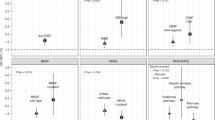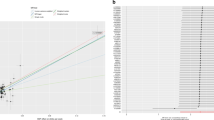Abstract
Although epidemiological studies of the relationship between cigarette smoking and colorectal cancer risk have been equivocal, a positive association is consistently found for colorectal adenoma development. We performed an epidemiological study to determine whether p53 protein overexpression, in tumours obtained at the time of resection, is associated with cigarette exposure in colorectal cancer. A total of 163 colorectal cancer cases and 326 healthy controls responded to a standardised questionnaire on colorectal cancer risk factors including detailed information on their history of cigarette smoking. All patients' tumours were analysed immunohistochemically for p53 overexpression using an avidin-biotin immunoperoxidase procedure and polyclonal anti-p53 antibody CM1. Comparison of colorectal cases with controls revealed an elevated risk for ex-smokers (OR = 1.34, 95% CI 0.85-2.12) and current smokers (OR = 1.13, 95% CI 0.63-2.02) when compared with non-smokers. No dose-response relationship was found for total pack-years of smoking (trend test: P = 0.19). However, a trend for total pack-years of smoking was found when p53-positive cases were compared with p53-negative cases suggesting aetiological, heterogeneity (trend test: P = 0.06). Estimating the individual relative risk of developing a p53-positive tumour relative to controls showed no associations for smoking status or total pack-years of smoking. However, when p53-negative cases were compared with controls, an elevated risk was found for ex-smokers (OR = 1.84, 95% CI 1.00-3.37) and current years of smoking (trend test: P = 0.03). Colorectal tumours developing through p53-positive dependent pathways were not associated with smoking exposure. A significant increase in risk was observed for the p53-negative independent pathway with smoking. p53 overexpression appears to be associated with smoking exposure in colorectal cancer.
This is a preview of subscription content, access via your institution
Access options
Subscribe to this journal
Receive 24 print issues and online access
$259.00 per year
only $10.79 per issue
Buy this article
- Purchase on Springer Link
- Instant access to full article PDF
Prices may be subject to local taxes which are calculated during checkout
Similar content being viewed by others
Author information
Authors and Affiliations
Rights and permissions
About this article
Cite this article
Freedman, A., Michalek, A., Marshall, J. et al. The relationship between smoking exposure and p53 overexpression in colorectal cancer. Br J Cancer 73, 902–908 (1996). https://doi.org/10.1038/bjc.1996.180
Issue Date:
DOI: https://doi.org/10.1038/bjc.1996.180
This article is cited by
-
Polymorphisms in methylenetetrahydrofolate reductase gene (MTHFR) and the age of onset of sporadic colorectal adenocarcinoma
International Journal of Colorectal Disease (2007)
-
GSTM1 and GSTT1 Polymorphisms, Cigarette Smoking, and Risk of Colon Cancer: A Population-based Case-control Study in North Carolina (United States)
Cancer Causes & Control (2006)
-
Tobacco, alcohol, and p53 overexpression in early colorectal neoplasia
BMC Cancer (2003)



